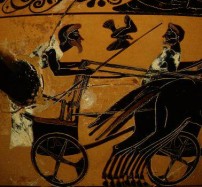| Only
the priestess of Demeter could watch them
seated on the altar of goddess that is
situated at the north side of the stadium. The
punishment of women that would violate the
prohibitory law was death. They pushed them
down the mountain Tipeo that was found at the
south of the sanctuary.
|
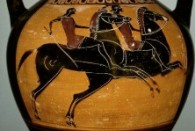 |
However
the only woman that violated the law and was
not punished was Callipateira, daughter of the
famous Olympic champion, Diagoras whose gender
was that of Olympic champions. For this reason
the judges did not punish her.Spectators
from all the places of Greece used to come in
order to watch the games.
|
|
| The
crowd that reached Olympia camped along the rivers or
under the trees. Apart from the individual pilgrims,
official delegations of cities –states composed of
distinguished citizens used to offer rich gifts in the
sanctuary. The athletes had to go to Ilida, the city
that organised the games, one month before their
beginning, in order to be trained under the
supervision of judges.Hellanodikes
(Greek judges) supervised the maintenance of the
regulations. Initially the institution of Hellanodikes
was hereditary and permanent. Perhaps from the 584
B.C. lot among the citizens of Ilia chose them. |
|
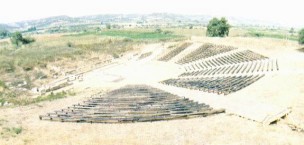
The theatre of
Ancient Ilida
|
They
were elected for one Olympiad and their training
lasted ten months. They stayed in Ilida in the so-called
Ellanodikeonas where they were taught the regulations
of the games. Also, apart from the organization and
the conduction of the games, they were responsible for
the award ceremony. They could also impose financial
and bodily penalties or even exclude athletes from the
games. |
|
|
The
income from the penalties was used tomanufacture
statues of Jupiter (Zeus) made of copper (Zanes plural of Zeus),
which were placed in Altis, in front of the Stadium’s entry.
The number of Hellanodikes was not the same during the
organization of the games. Initially they were two, later nine,
then twelve, and finally ten (from the 348 B.C.) until the end
of the games. |
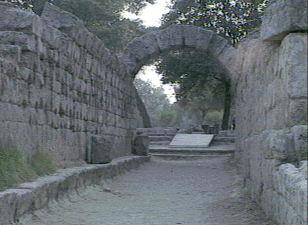
The entrance of Stadium
|
|
They used to
wear red mantles and were sitting on a grand stand south of
the stadium. The
people who announced the beginning of the games were called
spondofori (They were responsible for the peace treaties). |
|
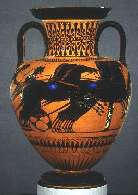
|
They
were carrying olive branches and make known the message of
sacred truce from city to city. During the truce (initially
one month, later three, while some talk about an interval of
ten months) all hostilities stopped, any armed man or group of
army could not pass in Ilia and it was prohibited the
performance of any death penalty. It is noticeable that during
the 1200 years the transgressions of the institution were few
and without any significance. This proves that it was a
powerful institution, absolutely acceptable.
|
| The
races were nude and were held in the stadium.
The equestrian races were held in the Hippodrome. Later
musical races were added.
|
|

